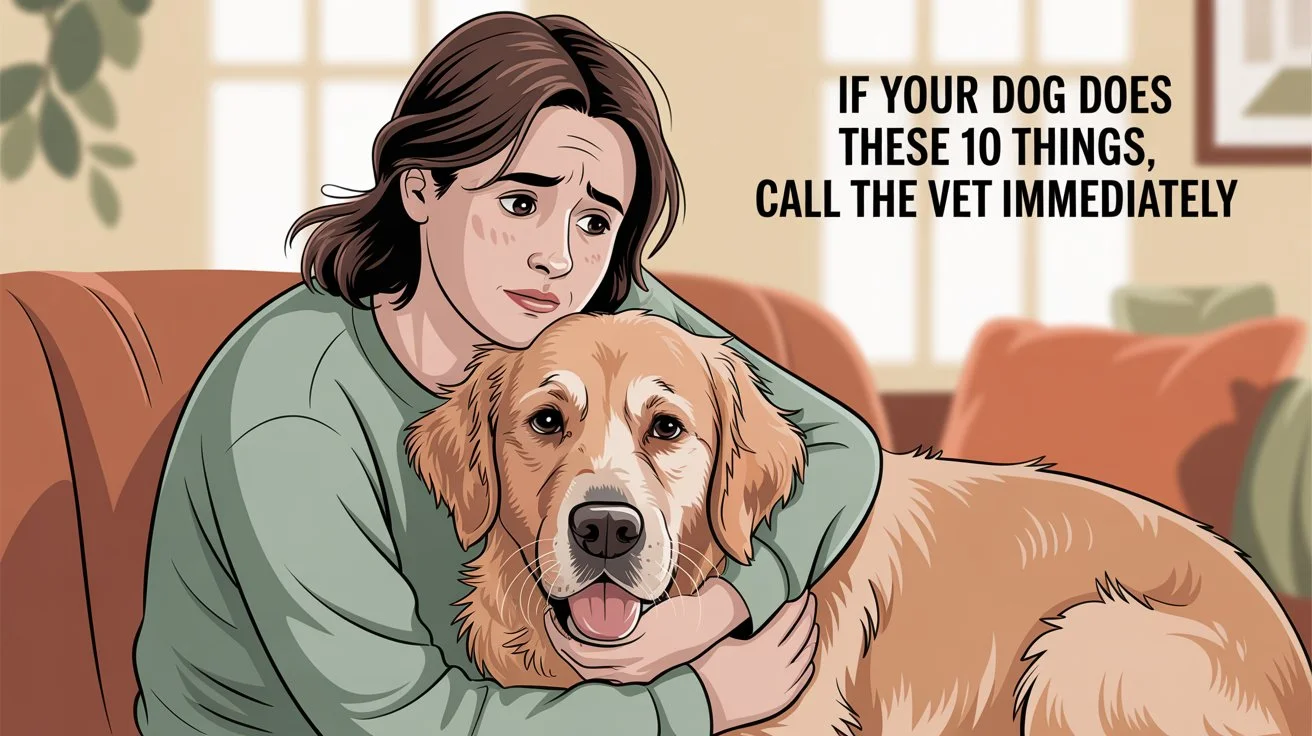These signs may look harmless — but they could be deadly
India’s love for dogs is growing stronger than ever — from pampered Pomeranians in Delhi to energetic Indies in Bengaluru. But as much as we adore our furry friends, many Indian dog owners miss critical warning signs of illness or distress simply because dogs can’t speak.
Ignoring these signs or “waiting to see” can be dangerous. Whether you live in an apartment in Mumbai or a farmhouse in Punjab, you need to know when your dog is trying to tell you: “I need help.”
Here are 10 dangerous signs that you should never ignore. If your dog shows any of these behaviors, call your veterinarian immediately — it could save their life.
1. Vomiting or Diarrhea — Especially With Blood
One episode of vomiting or loose motion may be nothing. But frequent vomiting or diarrhea, especially with blood, is a red alert.
In India, common causes include:
- Parvovirus (highly fatal if untreated in puppies)
- Poisoning (rat poison, chocolate, spoiled food)
- Infections from garbage or unclean water
🩺 Act fast — untreated dehydration in India’s hot climate can turn deadly in hours.
2. Loss of Appetite for Over 24 Hours
If your dog refuses food for an entire day, don’t assume it’s just “mood off.” It could be a sign of:
- Liver or kidney issues
- Fever from tick-borne diseases (like Ehrlichia or Babesia, common in India)
- Pain due to dental issues or internal injury
🐶 Offer boiled chicken or rice. If rejected, see your vet the same day.
3. Heavy Panting or Breathing Trouble — Even at Rest
Panting is normal after a walk or play. But continuous panting, choking sounds, or rapid breathing while lying down can signal:
- Heatstroke (especially in summer or with flat-faced breeds like Pugs, Bulldogs)
- Allergies
- Lung infection or fluid in lungs
🌡️ India’s summer heat can kill dogs in under 30 minutes if not treated.
4. Sudden Weakness or Collapse
If your usually active dog suddenly stumbles, struggles to walk, or collapses — it’s serious. It could be caused by:
- Low blood sugar (common in small breeds like Pomeranians)
- Heart failure
- Tick fever affecting red blood cells
🆘 Weakness can progress fast — don’t wait.
5. Swollen Belly or Abdomen Pain
A hard, bloated stomach could be a sign of gastric torsion (bloat) — a life-threatening condition that needs emergency surgery.
Other possible causes in India include:
- Worm infestation (especially in street dogs or rescues)
- Liver damage
- Internal bleeding after a fall or accident
🐾 If your dog cries when you touch their belly, visit the vet immediately.
6. Seizures or Twitching
Seeing your dog suddenly fall, shake uncontrollably, or lose consciousness is terrifying. It may be a sign of:
- Epilepsy
- Poisoning (rat poison, insecticide, even chocolate)
- Tick-related nervous system infection
🔌 Seizures are not normal. Don’t assume it will stop on its own.
7. Persistent Cough or Gagging
If your dog sounds like it’s trying to cough something up for more than 24 hours, it could indicate:
- Kennel cough
- Heartworm (common in mosquito-prone areas like Kerala, Goa)
- Throat obstruction or infection
📍 Especially in rainy or humid Indian weather, respiratory illnesses spread fast.
8. Dragging Hind Legs or Difficulty Walking
Sudden hind leg weakness or paralysis could be a symptom of:
- Tick paralysis (from infected tick bites)
- Spine injury
- Nerve compression
🪳 Ticks are a major cause of paralysis in Indian dogs. Even one infected tick can do serious damage.
9. Excessive Licking, Scratching, or Chewing
If your dog is licking its paws raw, scratching nonstop, or chewing its skin, it might have:
- Severe flea or tick infestation
- Mange (skin disease common in stray/Indie dogs)
- Fungal or bacterial infection
🧴 This isn’t “just itching.” It could lead to wounds, pus, or secondary infections.
10. Unusual Aggression, Confusion, or Change in Behavior
Has your friendly dog suddenly turned aggressive, withdrawn, or scared for no reason? It may signal:
- Pain or discomfort
- Rabies (especially in rescue dogs or those bitten by other animals)
- Brain infection or toxin exposure
🧠 Behavioral changes are often neurological. Don’t ignore mood shifts.
✅ Quick Summary: When to Call the Vet
| Symptom | Possible Cause | What to Do |
|---|---|---|
| Vomiting/Diarrhea (bloody) | Parvo, poison, infection | Vet ASAP |
| No appetite (24+ hrs) | Fever, liver issues | Blood test |
| Heavy breathing | Heatstroke, lung issue | Move to cool place + call vet |
| Collapse | Tick fever, heart problem | Urgent diagnosis |
| Swollen belly | Bloat, worms | X-ray or scan |
| Seizures | Epilepsy, poison | Emergency care |
| Persistent cough | Kennel cough, heartworm | Chest X-ray |
| Hind leg weakness | Tick paralysis | Anti-tick & nerve support |
| Excessive itching | Mange, infection | Skin treatment |
| Aggressive/odd behavior | Rabies, pain | Isolation + checkup |
🐶 Final Thoughts
In Indian households, dogs are more than pets — they’re protectors, companions, and emotional support. But in India’s unpredictable climate, with rising tick cases, extreme temperatures, and poor awareness, a small symptom can quickly turn into a tragedy.
Trust your instinct. If your dog “doesn’t seem right,” you’re probably correct.
➡️ Don’t delay. Call your local vet, even if it’s late at night.
Early action saves lives — and gives your loyal companion a chance to bounce back.
